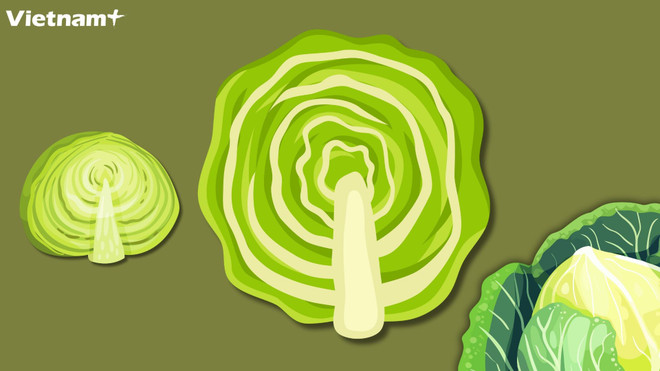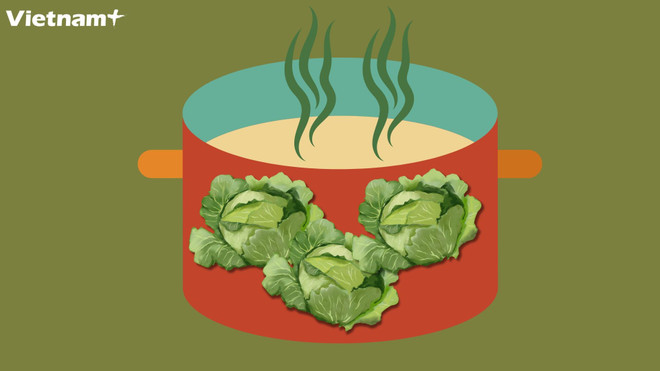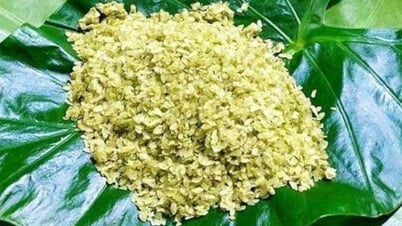Cabbage is a member of the same family as broccoli, Brussels sprouts, cauliflower, and kale. This vegetable, grown all over the world , is packed with vitamins and minerals.
According to the US National Nutrient Database, 1/2 cup of cooked, chopped cabbage (75 grams) contains: 17 calories; 4 grams of carbohydrates (including 2 grams of sugar and 1 gram of fiber); 1 gram of protein.
Eating half a cup of cooked cabbage provides 30–35 percent of your daily vitamin C needs and 81.5 micrograms of vitamin K; 11 milligrams of magnesium; 22 micrograms of folate. Additionally, cabbage provides vitamin B-6, calcium, potassium, and thiamin, but in smaller amounts.
Additionally, cabbage is high in fiber and contains powerful antioxidants, including polyphenols and sulfur compounds.
When comparing the color of cabbage, experts found that red cabbage contains more of this compound than green cabbage.
Cabbage is especially high in vitamin C, a powerful antioxidant that may protect against heart disease, certain cancers and vision loss.
Although cabbage has many health benefits, people with health problems should still be careful, especially when eating undercooked cabbage or cabbage salad.
Digestive disorders
Raw cabbage contains fiber, which is generally good for digestive health. However, for some people, the high fiber content can lead to indigestion, including gas and bloating.
Cooking cabbage can make it easier to digest, reducing the likelihood of causing the above side effects.
Goitrogens and Thyroid Function
Cabbage, like other cruciferous vegetables, contains compounds called goitrogens. These compounds can affect thyroid function by inhibiting iodine absorption.

Although cooking may help neutralize some of the goitrogenic activity, people with thyroid disease should still exercise caution and consult a healthcare professional.
Bloating and gas production
Raw cabbage contains compounds that can lead to increased gas production during digestion. For people who are prone to bloating or have sensitive digestive systems, eating raw cabbage may aggravate these problems.
Cooking cabbage can help break down these compounds, reducing the likelihood of causing excessive gas.
Ability to provide nutrients
Nutrient bioavailability is defined as the portion of a nutrient in food that is absorbed and utilized.
Although raw vegetables are often praised for retaining their nutritional content, some of the nutrients in cabbage become more bioavailable when cooked.
Cooking can enhance the absorption of certain vitamins and minerals, making them easier for the body to absorb.
Risk of allergy
Although rare, some people may be allergic to cabbage or certain proteins found in cabbage. Eating raw cabbage increases the risk of an allergic reaction.
While raw cabbage has its own benefits, it is essential to consider individual health factors and potential drawbacks.

Cooking cabbage can solve some digestive problems, increase nutrient absorption and eliminate the risk of certain diseases.
As with any dietary choice, you should strike a balance based on personal preferences, tolerance levels, and health considerations.
If you love cabbage, experiment with different cooking methods to provide a variety of culinary options while addressing potential issues associated with eating raw cabbage./.
Source: https://www.vietnamplus.vn/day-la-ly-do-tai-sao-ban-nen-luoc-ky-bap-cai-post1013981.vnp


![[Photo] Panorama of the Opening Ceremony of the National Press Festival 2025](https://vphoto.vietnam.vn/thumb/1200x675/vietnam/resource/IMAGE/2025/6/20/6b835ee92c2c4df587af73cb2d1f4f5f)

























![[Photo] General Secretary To Lam chairs the 14th Central Military Commission Conference](https://vphoto.vietnam.vn/thumb/1200x675/vietnam/resource/IMAGE/2025/6/20/a9d25fc6dd664fb9a3757502f32e5db0)



























![[Maritime News] Wan Hai Lines invests $150 million to buy 48,000 containers](https://vphoto.vietnam.vn/thumb/402x226/vietnam/resource/IMAGE/2025/6/20/c945a62aff624b4bb5c25e67e9bcc1cb)














































Comment (0)